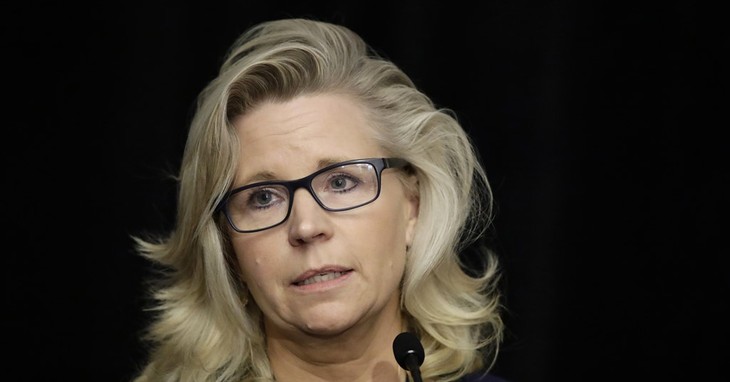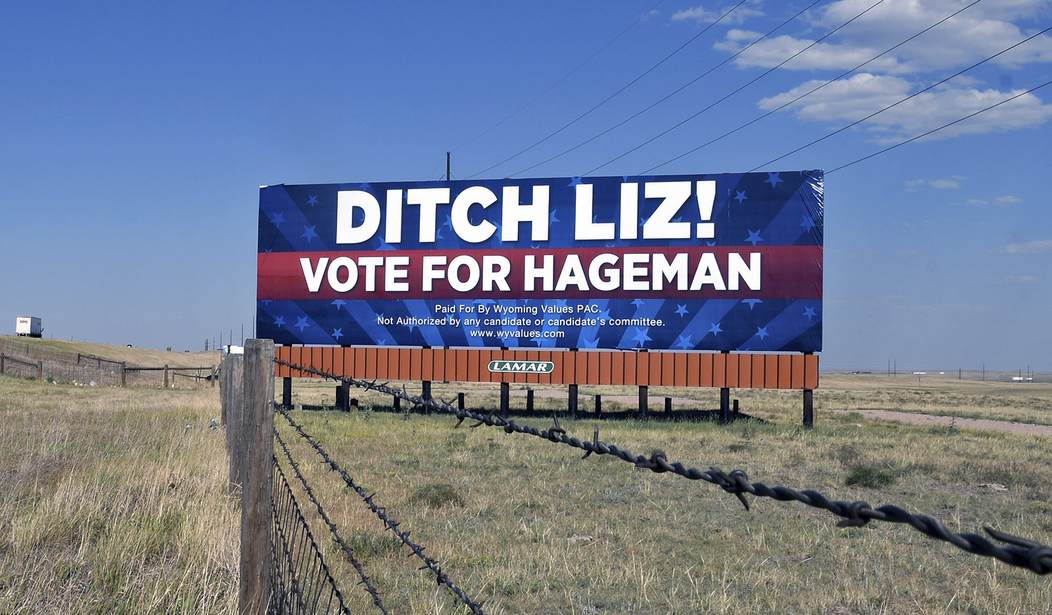Liz Cheney says she is “thinking about” running for president in 2024. She said that back in May, too. But that’s not normally what a House incumbent declares after going down worse than two-to-one in a party primary in their home state where her family name is iconic.
To be fair, Cheney was asked if she was running for president. To be honest, she knew that would happen. Reporters can be painfully predictable with their questions, and politicians know that.
To be clear, Liz Cheney has less chance in a 2024 presidential race than I do. And I’m not thinking about it.
But simply raising that possibility guarantees a Republican maverick intense media attention long-term. Call it the John McCain Factor. U.S. media simply cannot resist covering GOP infighting ad nauseam because it distracts them from Democrat infighting and failures and gives liberals hope that they have a chance against a splintered opposition party.
That’s why the Sunday news shows had the Republican loser on and not the actual victor, Harriet Hageman, who was endorsed, helped, and steered by Donald Trump’s folks.
But the former president can’t take all the credit for a Republican incumbent getting revenge-shellacked. If Liz Cheney really wanted to win a fourth House term (her father had five), she did just about every single thing wrong in a state that went 70 percent for Trump in 2020. And she shocked a broad array of her and her father’s long-time supporters.
If political martyrdom was her goal, Cheney ran a perfect campaign in the country’s most reliably Republican state that gave Trump his largest victory margin of any state.
Dick Cheney was a revered Wyoming native. He wrestled and played football for Natrona County High School in Casper and later was a generous donor to renew the hard-packed, dirt field with artificial turf where his future wife Lynne was a baton-twirler.
It should not be surprising that Liz Cheney and Hageman faced off in a nationally-watched race in Wyoming, which gave its hard-working frontier women equal voting rights 51 years before the nation did.
You must be approachable in predominantly rural Rocky Mountain politics with no airs about you. Dick Cheney looked gruff and tough on TV as vice president. And he was.
But in his later hometown of Jackson Hole, Cheney could be found regularly breakfasting in a back corner of Nora’s on Fish Creek restaurant, ready to chat with anyone about issues, hunting, fishing, anything that came up.
Liz not so much. After early childhood years in Wyoming, she spent her life in the Washington area as a lawyer and in George W. Bush’s State Department. Cheney once tried to prove Wyoming residency with a fish and game license, which anyone can get. To facilitate her political plans, she bought a Jackson residence in 2012.
But in 2013, she inexplicably announced a challenge for the Senate seat held by popular Mike Enzi, a surprising breach of state political etiquette. Clumsily, Cheney made the Wyoming campaign announcement in a Facebook post geo-tagged McLean, Va.
That effort, dubbed carpetbagging by some, lasted but six months. When Wyoming’s sole House member retired in 2015, Cheney announced. With her family name and conservative stances, all seemed forgiven. She inherited her father’s seat and quickly rose to the No. 3 GOP House leadership post.

During Trump’s tumultuous presidency, Cheney was occasionally critical but routinely supported the president. That ended after the Jan. 6 incident. She was often loudly and harshly critical of Trump, so much so that the GOP House caucus stripped her leadership post.
She also voted in favor of Trump’s impeachment in the second trial and accepted Nancy Pelosi’s offer to co-chair the one-sided Jan. 6 committee.
This prompted veteran commentator Brit Hume to provocatively ponder:
I wonder if things might have turned out differently for Liz Cheney if she’d used her seat on the 1/6 committee to insist on cross-examination of witnesses and a chance for the defense to present its side. Instead, she led the charge for an utterly one-sided presentation.
She always seems available to denounce Trump on national media but made little real effort to explain herself back home where the state party canceled her membership. “All politics are local,” is usually attributed to the late Speaker Tip O’Neill. He actually stole it from an AP columnist for his first campaign in 1935.
Its truth endures, however, and Cheney had to know this. She collected far more money than her opponent — $15 million — much of it from out-of-state, not well-received in rural America.
Her entire campaign and virtually every statement was about bad-guy Trump, which came across as more pro-Biden than she realized. But that altered nothing. In her concession remarks, Cheney mentioned Wyoming one time. She seemed sorely oblivious to the needs and concerns of folks she had sworn to represent in the nation’s least-populated state.
In Liz Cheney’s widely-viewed campaign video featuring the former vice president, her father denounced Trump as the most serious threat to democracy in American history. Strangely for a native, not once did he utter the word Wyoming. (It’s an amalgam of Indian words for “big plains.”)
“Liz may have been right on principle,” said a long-time supporter, “But she was wrong on tactics.” My way or the highway has replaced pragmatic compromise for half-a-loaf in modern American politics.
Hageman’s campaign was the polar opposite. She’s a local natural resources attorney, 59 years old, known as hard-right, but not a political veteran. She had a brief unsuccessful campaign for governor and while she generally favors Trump’s policies, her support for him and his stolen election mantra came late.
Her hard-hitting professional ads carved up Cheney as a carpetbagger with little interest in the state’s needs and people while focused solely on her antipathy toward the still-popular ex-president. In Wyoming, Hageman’s campaign and targeting are widely deemed too slick for such an inexperienced pol, suggesting outside help.

Trump targeted Cheney as one of the 10 Republicans who voted to impeach him. His endorsement was vociferous and included one of his trademark rallies, held in Casper, Dick Cheney’s hometown.
Perhaps the most effective but least-noticed step in defeating Cheney was the fact that Hageman was the only serious Cheney primary challenger in a state where such ballots are typically loaded with wannabes splitting the vote. “Someone effectively cleared the field,” said one political operative. “And it wasn’t Harriet.”
On a personal note, I’ve seen U.S. politics up close from inside. And the dedication, hard work, and sacrifice of offering oneself for elected office are real and impressive, whichever side you’re on. Most of us do not have that courage.
So, it’s disappointing to see so many now reveling in someone’s defeat, whether it’s Liz Cheney or Donald Trump, instead of simply celebrating their candidate’s win.
Blindly voting against a candidate to elect a less-examined alternative is a lesson Americans should have learned in 2020, now being stuck with Joseph Robinette Biden Jr.
What’s next for Liz Cheney, who’ll leave office come January? Maybe a book. Within hours of conceding, Cheney formed a PAC called The Great Task, a phrase from the 1864 closing lines of the Gettysburg Address by the first GOP president, Abraham Lincoln:
It is rather for us to be here dedicated to the great task remaining before us — that from these honored dead we take increased devotion to that cause for which they gave the last full measure of devotion…
The PAC will enable her to raise money for travel and possible distribution to others to continue her anti-Trump campaign and “do whatever it takes” to ensure the 45th president does not become the 47th.
She’s said:
I believe that Donald Trump continues to pose a very grave threat and risk to our republic. And I think that defeating him is going to require a broad and united front of Republicans, Democrats and independents, and that’s what I intend to be a part of…
We’ve now got one major political party, my party, which has really become a cult of personality, and we’ve got to get this party back to a place where we’re embracing the values and the principles on which it was founded.
Assuming Trump gets the GOP nomination in 2024, which is not guaranteed, Cheney could in theory mount a third-party presidential campaign appealing to those conservatives, independents, and Democrats who are drifting away from Trump’s nonstop, complaining look back at the 2020 election. Polls show their ranks have grown, though perhaps not enough to stall a Trump replay.
Such a Cheney effort would be politically suicidal. But then, Liz Cheney just willfully crashed her own political career into a Wyoming mountainside. So, what’s to lose?
The 56-year-old lawyer would have zero chance of becoming the first female president. But then, in 1992, Ross Perot had zero chance of becoming the first billionaire president.
He won only 19 percent of the popular vote, putting him in third place. That was enough, however, to torpedo Republican George H.W. Bush’s reelection and vault Democrats Bill and Hillary Clinton into the White House for eight long years and even more tedious times since in the nation’s public life.













